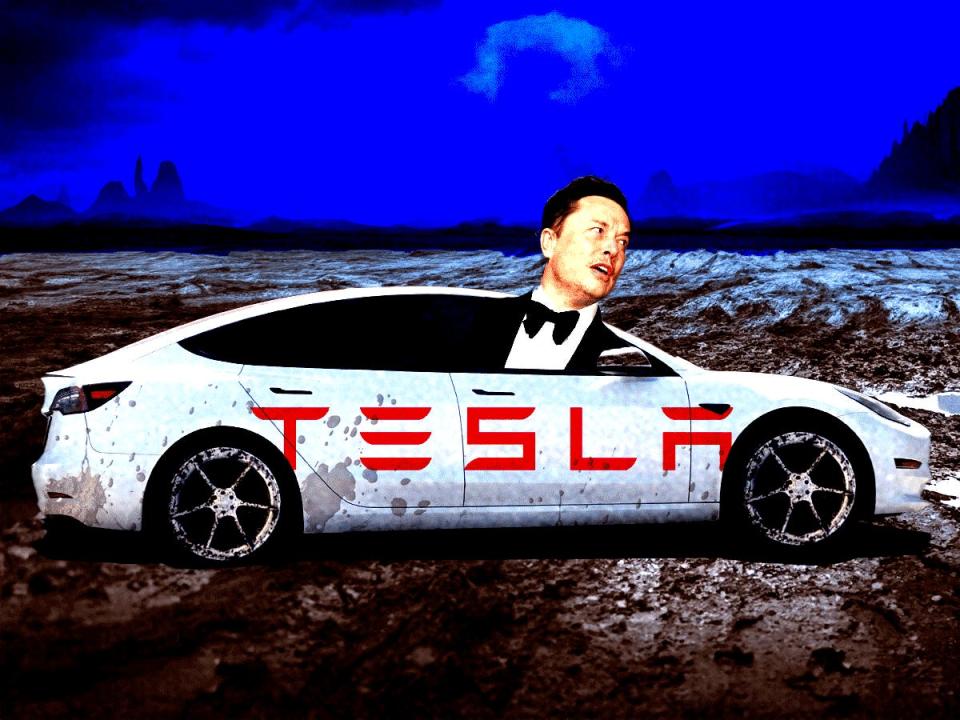Tesla is stuck in the mud

Tesla is having a rough start to the year.
The EV maker reported disappointing deliveries for Q1, before announcing sweeping layoffs.
With falling demand in the US and increased competition in China, Tesla is in a tough spot.
Tesla is in full-blown cost-cutting mode.
After releasing a disastrous first-quarter sales report this month, CEO Elon Musk announced the company would reveal a long-awaited robotaxi in August.
But that announcement was quickly overshadowed by sweeping layoffs, something Musk attributed to a reorganization and streamlining "for the next phase of growth."
In all, Tesla said it would cut more than 10% of its workforce, amounting to more than 14,000 people. Tesla is also losing some key top executives: Drew Baglino and Rogan Patel announced this week they would leave the company. Baglino was senior vice president for powertrain and energy engineering and Patel was vice president of public policy and business development.
It's unclear what, exactly, Tesla plans to show off in August as a self-driving, revenue-generating new product. And in the months between then and now, investors are demanding more than a rehashed robotaxi dream.
It's not Musk's first time promising a self-driving taxi
Musk said in 2019 that he expected Tesla to have 1 million cars on the road in the next year that could function as robotaxis.
"We believe we'll have the most profitable autonomous taxi on the market," he said on an earnings call in April of that year.
On a separate fundraising call around that time, he said Full Self-Driving could propel Tesla to a $500-billion valuation, and make Teslas worth up to $250,000, CNBC reported at the time. He also reportedly said Tesla robotaxis would be able to do 100 hours of work a week for their owners.
In the years since, Tesla's Full Self-Driving software (which remains Level 2, even as competing automakers have reached Level 3 and beyond), has rolled out to more vehicles as Tesla has continued to outsell competitors. Its market cap did, in fact, hit $500 billion, as Musk predicted. And it turned a profit at long last.
But a robotaxi never materialized, even as Musk continued to tout FSD as a continued linchpin to Tesla's growth.
Now, cheaper EVs have thrown a wrench into Musk's plans
Tesla started an all-out price war in 2023, slashing prices up to $20,000 and bringing its best-selling model below the average price for any new car (about $47,000 in March 2024) in an effort to boost sales and stay ahead of the competition.
More than a year in, Tesla has, for the most part, maintained its pricing edge thanks to industry-leading margins, while some other automakers rethink their EV plans.
But Tesla might not remain the price leader forever. According to Reuters, Tesla has ended plans for another one of Musk's longtime pet projects: a truly affordable EV. The car, sometimes called the Model 2, was expected to cost $25,000 — about $14,000 less than Tesla's cheapest sedan.
Musk disputed the report, which cited internal documents and multiple people with knowledge of the matter, leaving analysts scratching their heads about what comes next.
After years of growth at hyper-speed, Tesla reducing its labor force isn't unthinkable — especially after building a brand new factory to churn out an entirely new (and not-yet-profitable) product — but it could hint at demand problems.
"The sweeping layoffs announced yesterday, amounting to a reduction in crewed production capacity, should now leave no doubt that the decline in deliveries has been a function of lower demand and not supply," JPMorgan analyst Ryan Brinkman said in a note to clients on Tuesday as shares fell to their lowest levels in more than a year.
Kelley Blue Book data also points to flagging demand, showing Tesla's share of the US EV market has fallen to 51% this year from 62% in 2023.
And Tesla is facing intensifying competition in China, where it's now neck-and-neck with homegrown EV startups like BYD, who are exporting their cheaper cars to Europe, Asia, and Mexico, further increasing the pressure.
Musk is sure to face questions about the Model 2 when it reports earnings on April 23. Analysts will also be looking to learn how a robotaxi can turn a profit, too.
"Investors are struggling to see how the company can use its infrastructure and network to achieve a path to monetization," Adam Jonas, a longtime Tesla bull, said in a note to clients on April 11.
And first, they'll have to get them street-legal.
Read the original article on Business Insider

 Yahoo Autos
Yahoo Autos 